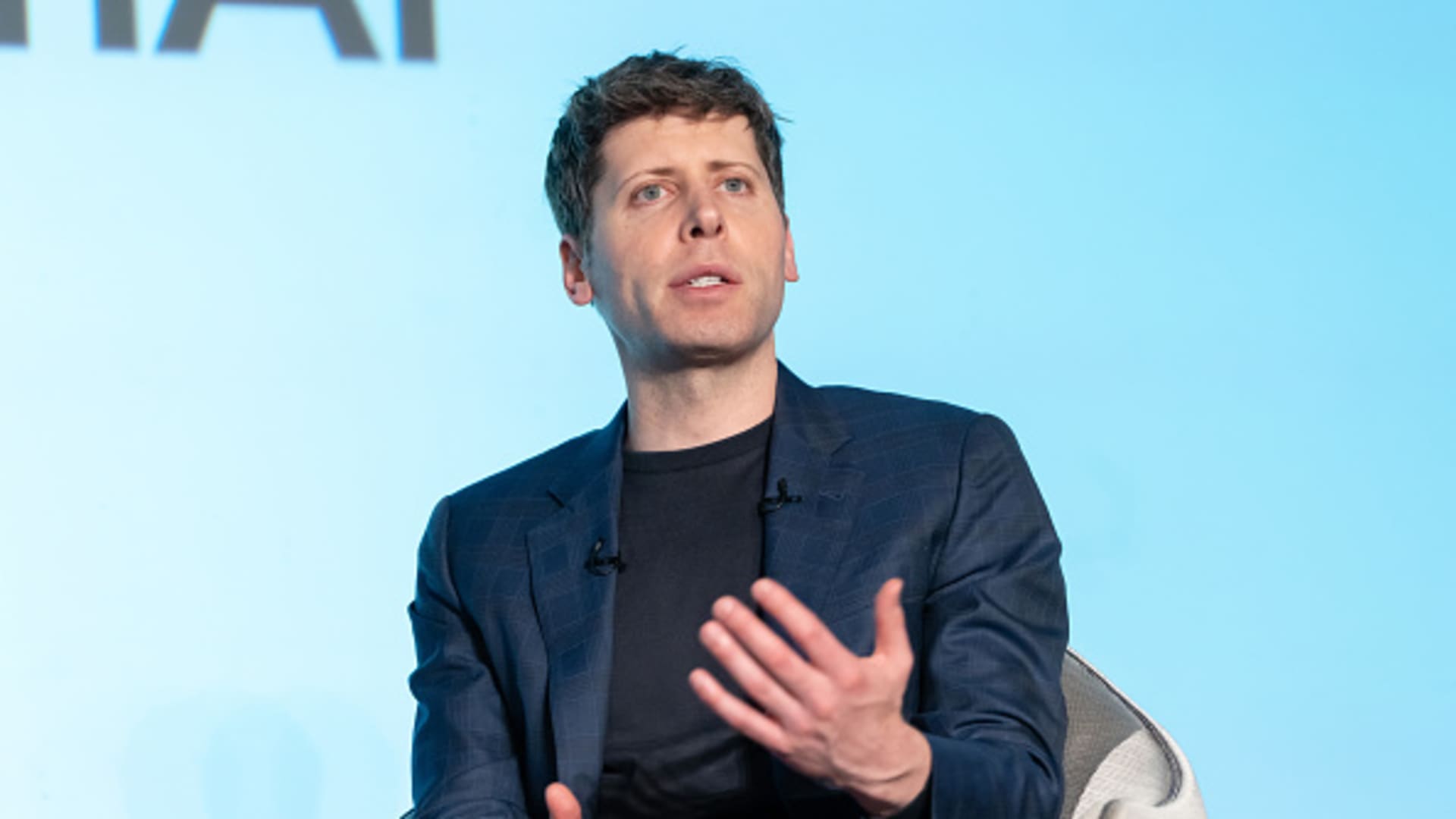
Sam Altman did not got down to compete with Nvidia.
OpenAI started with a easy guess that higher concepts, not higher infrastructure, would unlock synthetic basic intelligence. However that view shifted years in the past, as Altman realized that extra compute, or processing energy, meant extra functionality — and in the end, extra dominance.
On Monday morning, he unveiled his newest blockbuster deal, one which strikes OpenAI squarely into the chipmaking enterprise and additional into competitors with the hyperscalers.
OpenAI is partnering with Broadcom to co-develop racks of customized AI accelerators, purpose-built for its personal fashions. It is a huge shift for an organization that after believed intelligence would come from smarter algorithms, not greater machines.
“In 2017, the factor that we discovered was that we had been getting the most effective outcomes out of scale,” the OpenAI CEO stated in an organization podcast on Monday. “It wasn’t one thing we got down to show. It was one thing we actually found empirically due to all the pieces else that did not work practically as properly.”
That perception — that the important thing was scale, not cleverness — essentially reshaped OpenAI.
Now, the corporate is increasing that logic even additional, teaming up with Broadcom to design and deploy racks of customized silicon optimized for OpenAI’s workloads.
The deal offers OpenAI deeper management over its stack, from coaching frontier fashions to proudly owning the infrastructure, distribution, and developer ecosystem that turns these fashions into lasting platforms.
Altman’s speedy sequence of offers and product launches is assembling a whole AI ecosystem, very similar to Apple did for smartphones and Microsoft did for PCs, with infrastructure, {hardware}, and builders at its core.

{Hardware}
By way of its partnership with Broadcom, OpenAI is co-developing customized AI accelerators, optimized for inference and tailor-made particularly to its personal fashions.
Not like Nvidia and AMD chips, that are designed for broader industrial use, the brand new silicon is constructed for vertically built-in techniques, tightly coupling compute, reminiscence, and networking into full rack-level infrastructure. OpenAI plans to start deploying them in late 2026.
The Broadcom deal is just like what Apple did with its M-series chips: management the semiconductors, management the expertise.
However OpenAI goes even additional and engineering each layer of the {hardware} stack, not simply the chip.
The Broadcom techniques are constructed on its Ethernet stack and designed to speed up OpenAI’s core workloads, giving the corporate a bodily benefit that is deeply entangled with its software program edge.
On the similar time, OpenAI is pushing into client {hardware}, a uncommon transfer for a model-first firm.
Its $6.4 billion all-stock acquisition of Jony Ive‘s startup, io, introduced the legendary Apple designer into its internal circle. It was an indication that OpenAI would not simply need to energy AI experiences, it needs to personal them.
Ive and his staff are exploring a brand new class of AI-native units designed to reshape how individuals work together with intelligence, shifting past screens and keyboards towards extra intuitive, partaking experiences.
Studies of early ideas embody a screenless, wearable system that makes use of voice enter and refined haptics, envisioned extra as an ambient companion than a standard gadget.
OpenAI’s twin guess on customized silicon and emotionally resonant client {hardware} provides two extra highly effective branches over which it has direct management.

Blockbuster offers
OpenAI’s chips, datacenters and energy fold into one coordinated marketing campaign referred to as Stargate that gives the bodily spine of AI.
Up to now three weeks, that marketing campaign has gone into overdrive with a number of main offers:
- OpenAI and Nvidia have agreed to a framework for deploying 10 gigawatts of Nvidia techniques, backed by a proposed $100 billion funding.
- AMD will provide OpenAI with a number of generations of its Intuition GPUs beneath a 6-gigawatt deal. OpenAI can purchase as much as 10% of AMD if sure deployment milestones are met.
- Broadcom’s customized inference chips and racks are slated to start deployment in late 2026, as a part of Stargate’s first 10‑gigawatt section.
Taken collectively, it’s OpenAI’s push to root the way forward for AI in infrastructure it could actually name its personal.
“We’re in a position to suppose from etching the transistors all the best way as much as the token that comes out whenever you ask ChatGPT a query, and design the entire system,” Altman stated. “We will get big effectivity positive aspects, and that may result in significantly better efficiency, quicker fashions, cheaper fashions — all of that.”
Whether or not or not OpenAI can ship on each promise, the dimensions and pace of Stargate is already reshaping the market, including a whole lot of billions in market cap for its companions, and establishing OpenAI because the de facto market chief in AI infrastructure.
None of its rivals seems in a position to match the tempo or ambition. And that notion alone is proving a strong benefit.
Builders
OpenAI’s DevDay made it clear that the corporate is not simply targeted on constructing the most effective fashions — it is betting on the individuals who construct with them.
“OpenAI is attempting to compete on a number of fronts,” stated Gil Luria, Head of Expertise Analysis at D.A. Davidson, pointing to its frontier mannequin, consumer-facing chat product, and enterprise API platform. “It’s competing with some mixture of all the massive expertise corporations in a number of of those markets.”
Developer Day, he stated, was geared toward serving to corporations incorporate OpenAI fashions into their very own instruments.
“The instruments they introduced had been very spectacular — OpenAI has been terrific at commercializing their merchandise in a compelling and easy-to-use method,” he added. “Having stated that, they’re combating an uphill battle, for the reason that corporations they’re competing with have considerably extra sources — at the least for now.”
The primary competitors, Luria stated, is primarily Microsoft Azure, AWS and Google Cloud.
Developer Day signaled simply how aggressively OpenAI is leaning in.
The corporate rolled out AgentKit for builders, new API bundles for enterprise, and a brand new App Retailer that provides direct distribution inside ChatGPT — which now reaches 800 million weekly lively customers, in keeping with OpenAI.
“It is the Apple playbook: personal the ecosystem and turn into a platform,” stated Menlo Ventures companion Deedy Das.

Till now, most corporations handled OpenAI as a device of their stack. However with new options for publishing, monetizing, and deploying apps instantly inside ChatGPT, OpenAI is pushing for tighter integration — and making it more durable for builders to stroll away.
Microsoft CEO Satya Nadella pursued an analogous technique after taking on from Steve Ballmer.
To construct belief with builders, Nadella leaned into open supply and acquired GitHub for $7.5 billion, a transfer that signaled Microsoft’s return to the developer group.
GitHub later grew to become the launchpad for instruments like Copilot, anchoring Microsoft again on the heart of the fashionable developer stack.
“OpenAI and all the massive hyperscalers are going for vertical integration,” stated Ben Van Roo, CEO of Legion Intelligence, a startup constructing safe agent frameworks for protection and intelligence use instances.
“Use our fashions and our compute, and construct the next-gen brokers and workflows with our instruments. The market is huge. We’re speaking about changing SaaS, huge techniques of document, and actually a part of the labor drive,” stated Van Roo.
SaaS stands for software program as a service, a bunch of corporations specializing in enterprise software program and providers, of which Salesforce, Oracle and Adobe are half.
Legion’s technique is to remain model-agnostic and concentrate on safe, interoperable agentic workflows that span a number of techniques. The corporate is already deploying inside categorized Division of Protection environments and embedding throughout platforms like NetSuite and Salesforce.
However that very same shift additionally introduces danger for the mannequin makers.
“Brokers and workflows make among the huge LLMs each highly effective and possibly much less crucial,” he famous. “You’ll be able to construct reasoning brokers with smaller and particular workflows with out GPT-5.”
The instruments and brokers constructed with main LLMs have the potential to interchange legacy software program merchandise from corporations like Microsoft and Salesforce.
That is why OpenAI is racing to construct the infrastructure round its fashions. It is not simply to make them extra highly effective, however more durable to interchange.
The actual guess is not that the most effective mannequin will win, however that the corporate with probably the most full developer loop will outline the subsequent platform period.
And that is the imaginative and prescient for ChatGPT now: Not only a chatbot, however an working system for AI.




